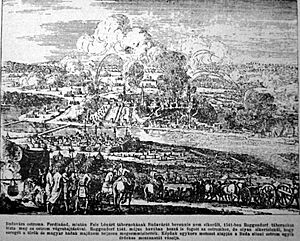Siege of Buda (1541) facts for kids
Quick facts for kids Siege of Buda (1541) |
|||||||
|---|---|---|---|---|---|---|---|
| Part of the Little War in Hungary | |||||||
 |
|||||||
|
|||||||
| Belligerents | |||||||
|
|||||||
| Commanders and leaders | |||||||
| Wilhelm von Roggendorf (DOW) Jeromos Záray † |
Suleiman the Magnificent Şehzade Mehmed Şehzade Selim Şehzade Bayezid Hadım Suleiman Pasha Damat Rüstem Pasha Semendireli Mehmed-beg Bishop George Martinuzzi Bálint Török |
||||||
| Strength | |||||||
| 31,000-50,000 | 52,000 | ||||||
| Casualties and losses | |||||||
| ~20,000 | Unknown | ||||||
The Siege of Buda happened between May 4 and August 21, 1541. It was a big battle where the city of Buda, the old capital of Hungary, was taken over by the Ottoman Empire. This event led to the Ottomans ruling parts of Hungary for about 150 years. This siege was a key victory for the Ottomans against the Habsburg monarchy during the long wars between them. These wars lasted from the 16th to the 18th century in Hungary and the Balkans.
What Led to the Siege?
After the Battle of Mohács in 1526, the Kingdom of Hungary was split. The Ottoman Empire was expanding from the east, while the Habsburg monarchy claimed the title of King of Hungary.
In 1540, John I of Hungary, who was allied with the Ottomans, passed away. His young son, John II Sigismund Zápolya, became king. His mother, Isabella Jagiellon, and a bishop named George Martinuzzi helped him rule. The Ottoman leader, Suleiman the Magnificent, agreed to this. But he said the Hungarians must keep paying money to the Ottoman Sultan.
However, the Habsburgs did not accept the new young king. Ferdinand I, who was the Archduke of Austria and a Habsburg, sent a large army to attack Buda.
The Siege of Buda
Ferdinand I's army had about 50,000 soldiers. These troops came from Austria, German areas, Bohemia, and Habsburg-controlled Hungary. Wilhelm von Roggendorf led this army. They started attacking Buda in the summer of 1541.
The attack on Buda did not go well. The Habsburg army made several attempts to capture the city, but they failed. Many soldiers were lost on their side.
Suleiman the Magnificent then decided to lead an Ottoman army himself to help Buda. His army included 6,362 elite soldiers called Janissaries. On August 21, the Ottoman army arrived at Buda. They fought against Roggendorf's army. The Habsburg army was defeated, and about 20,000 of their men were killed or drowned in the river. Roggendorf was hurt in the battle and died two days later.
After the battle, the Ottomans took over the city. They used a clever trick to get inside. Suleiman invited the young King John II and some Hungarian noblemen to his tent. Meanwhile, Ottoman soldiers slowly entered the fort. They pretended to be "tourists" admiring the buildings. Suddenly, they pulled out their weapons and took control of the guards and the whole fort.
At the same time, the Hungarian noblemen felt uneasy in the Sultan's tent. They wanted to leave. Just then, Suleiman shouted, "The black soup (coffee) is still to come!" This was a signal. The Turkish soldiers then took the weapons from the Hungarian visitors. All of them were allowed to leave except for one person: Bálint Török. Suleiman saw him as a strong possible enemy. Bálint Török was taken prisoner and sent to a fortress called Yedikule Fortress, where he spent the rest of his life. The royal family, the noblemen, and the people of Buda were allowed to leave the city safely with their belongings.
What Happened Next?
The Siege of Buda was a very important victory for the Ottomans against Ferdinand and the Habsburgs. This win allowed the Ottomans to control central Hungary for about 150 years. Because of this, the siege is as important as the Battle of Mohács in 1526.
Charles V, who was Ferdinand's brother and a powerful emperor, heard about the defeat. He was very upset and wanted revenge. He then launched an attack against Algiers in 1541, but that also ended in a big loss for the Habsburgs.
Ferdinand tried to take back Buda and another city called Pest in 1542. But the Ottomans successfully defended them.
See also
 | Isaac Myers |
 | D. Hamilton Jackson |
 | A. Philip Randolph |

